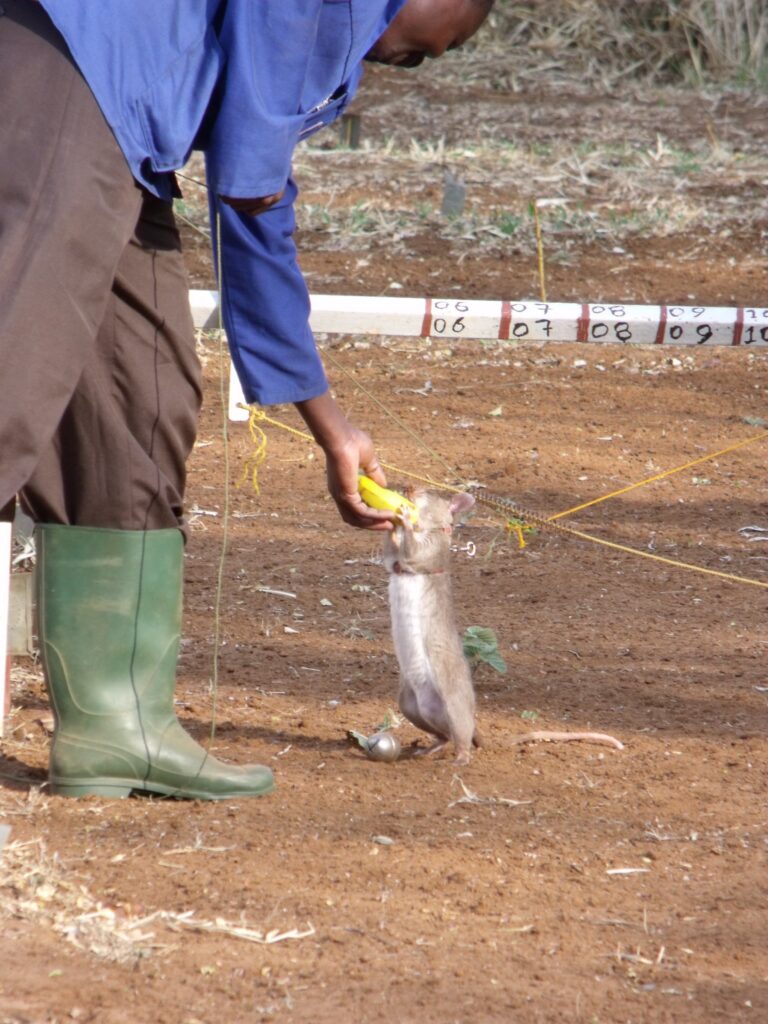Bart Weetjens and APOPO

Credit: rattyfied
Licence: CC BY-NC-SA 2.0
| Giver: | Registered Organization |
|---|---|
| Receiver: | - |
| Gift: | - |
| Approach: | Philanthropy |
| Issues: | 15. Life on Land |
| Included in: | Humanitarianism & Philanthropy |
APOPO is a Belgian nongovernmental organization (NGO) dedicated to eradicating landmines in regions ravaged by war. Founded by Bart Weetjens in 1997, APOPO deploys explosives-sniffing rats and dogs into active minefields, transforming unsafe areas back into usable land. In its first twenty-five years of operation, APOPO’s revolutionary approach detected and eliminated more than 155,000 landmines, restoring nearly 90 million square meters to long-suffering communities.
Compassion with a Purpose
Weetjens discovered his humanitarian spirit at a young age. Neglected as a child, he found emotional satisfaction by breeding and training pet rodents. A year at military school, with its culture of bullying and aggression, only reinforced the young man’s pacifist tendencies. While studying product design at Antwerp University, Weetjens experienced an emotional crisis that led him to take up Zen meditation, a practice that would come to define his life’s work.
A documentary about landmines inspired Weetjens to create the Anti-Persoonsmijnen Ontmijnende Product Ontwikkeling program, or APOPO. In partnership with the Sokoine University of Agriculture in Morogoro, Tanzania, APOPO launched a landmine detection program using African giant pouched rats, a species of rodent renowned for its keen sense of smell.
An Innovative Solution to a Global Crisis
After socializing the rats to trust human handlers, researchers trained them to respond specifically to the presence of explosive materials, rewarding them with bananas. Within a year, the rodents were ready for duty. The rats were initially deployed in Mozambique in 2003, with additional missions following in Cambodia (2010) and Angola (2012).
Because of their lightweight frames (between 1.0 and 1.5 kg or 2.2 and 3.3 lb), APOPO rats can move across dangerous territory without triggering unexploded mines. Further, APOPO’s rats have proved far more efficient than conventional minesweepers, requiring only a half hour to clear the same land area that might take a human up to four days to cover.
An exceptionally dedicated rat, Magawa, cleared 35 acres over his five-year career, sniffing out more than 100 landmines. For his service, Magawa earned a gold medal from the People’s Dispensary for Sick Animals in the U.K.
Over time, APOPO has expanded its operations into other areas of Africa and Central Asia, adding trained Technical Survey Dogs (TSDs) to their mine-sweeping ranks. The organization has also trained its “HeroRATS” to detect tuberculosis in lab samples, enabling health workers to respond more rapidly to disease outbreaks. APOPO has even launched a donor adoption program for HeroRATs retiring from duty.
Cultivating Self-Care in the Practice of Giving
In 2015, Mozambique was officially declared free of landmines. That year Weetjens stepped away from APOPO to focus on his meditation practice. In interviews, he described his work in landmine eradication as its own form of “war,” as the struggle to meet targets and satisfy donors took a toll on his mental health. In association with the Wellbeing Project, Weetjens began helping corporate leaders and social entrepreneurs develop self-care techniques to prevent burnout, depression and other psychological pitfalls associated with their work.
Bart Weetjens’s career presents a unique model for giving in the twenty-first century. Through his ingenuity and passion he has enabled war-ravaged communities to reclaim their land for economic, social and other productive uses. By helping social actors confront personal trauma, Weetjens empowers individuals to channel their altruistic impulses more effectively, cultivating a culture of generosity that is both more compassionate and more sustainable. Finally, his love of animals has increased awareness of the bond humans share with all living things — promoting a sense of interconnectedness that could prove our most effective weapon against environmental and ecological ruin.
Contributors: Maha Tazi, Stephen Meyer
| Source type | Full citation | Link (DOI or URL) |
|---|---|---|
| Publication |
Mahoney, Amanda; Durgin, Amy; Poling, Alan; Weetjens, Bart; Cox, Christophe; Tewelde, Tess; Gilbert, Tekimiti. “Mine Detection Rats: Effects of Repeated Extinction on Detection Accuracy,” Journal of Conventional Weapons Destruction, Vol. 16, Isue3, The Center for International Stabilization and Recovery, James Madison University, 2012. |
http://bit.ly/3LOdFbY |
| Publication |
De Guzman, Chad. “Magawa the Landmine –Sniffing Rat Was an International Hero,” TIME Magazine, 2022. |
https://time.com/6138994/magawa-dies-landmines-cambodia/ |
| Publication |
“Giant African Pouched Rats Find Landmines and Much More,” F3 Freedom From Fear Magazine, Ghent University, 2009. |
https://f3magazine.unicri.it/?p=399 |
| Publication |
Becker, Rachel A. “Meet the Giant Rats That are Sniffing out Landmines,” National Geographic, 2015. |
http://bit.ly/3ZdZFLE |
| Publication |
Dekhane, Malvika. “HeroRATs to the Rescue,” NISCAIR-CSIR, India, 2021. |
ISSN: 2584-6492 (Online); 0036-8512 (Print). |